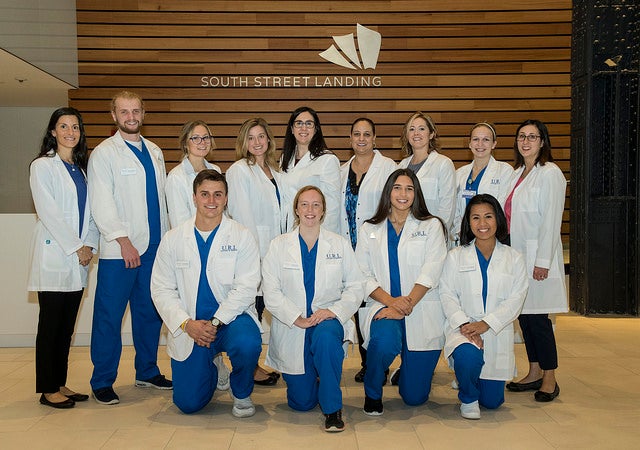Nurses continue to play an ever-expanding role not just in direct patient care but also in the overall delivery of healthcare, requiring practicing nurses to enhance their education and scientific experience to meet the growing demands on the profession.
The University of Rhode Island College of Nursing is poised to meet that demand, offering a wide variety of advanced degree programs at the state-of-the-art Nursing Education Center in Providence. Practicing nurses and nursing students finishing up their undergraduate degrees have the chance to expand their career opportunities and position themselves to make a substantial impact on the future of healthcare.
“Our graduate programs are designed to prepare the most capable, dynamic health care professionals in the industry,” said Barbara Wolfe, dean of the URI College of Nursing. “Nurses are playing an ever-amplifying role in the delivery of healthcare, and our program offerings have expanded beyond traditional patient care to match that trend.”
Whether you are seeking a Master’s degree or a Ph.D., the College’s graduate programs prepare nurse scholars and researchers capable of advancing healthcare knowledge through the development and testing of nursing theory and the conduct of research in clinical practice. The NEC offers graduate nursing students the latest technology, and the most advanced patient simulation labs and research facilities available. The center combines leading technology with a rigorous experiential learning curriculum, placing Rhode Island at the forefront of the nation in graduate nursing education.
The URI College of Nursing graduate programs Find the program that’s right for you. Browse the College’s offerings below and click the links for more information on each program:
- Ph.D. in Nursing. A focus on clinical research and the testing of nursing theory cultivates a sense of inquiry and stimulates collaborative relationships with professional colleagues both in nursing and other disciplines.
- Doctor of Nursing Practice. (B.S. or M.S. to D.NP.) The program prepares advanced practice nurses at the highest level for clinical practice. It prepares clinicians capable of translating scientific findings, evaluating outcomes and programs, producing clinical scholarship, and transforming health care systems and policies.
- Master of Science. Designed to accommodate both full- and part-time students, the program is perfect for practicing nurses looking to enhance their education without stalling their careers. The program prepares professional nurses to assume leadership roles in a variety of settings.
The College’s graduate programs also offer several specializations that are in increasing demand, including:

